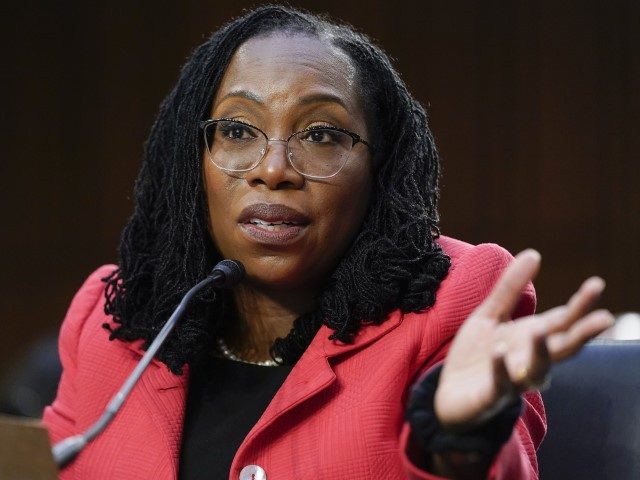Supreme Court nominee Judge Ketanji Brown Jackson had a tough day Tuesday, as she faced the first serious questions about her record and her judicial philosophy.
Judge Jackson came across during the introduction hearing on Monday as a personable, likable and accomplished attorney and jurist, with a beautiful family. On Tuesday, however, she was unable to satisfy concerns that she harbors deeply radical political views, and that she has a record of being too soft on sex offenders.
There were several key points:
1. Sen. Ted Cruz (R-TX) nailed Jackson on the “1619 Project,” Critical Race Theory, and her sentencing record. Cruz honed in on Judge Jackson’s 2020 speech praising the “1619 Project” and Critical Race Theory, which declare that America was both founded on racism and remains systemically racist. She professed not to know that the central thesis of the 1619 Project — the false claim that the American Revolution was fought to defend slavery — had been debunked. She also claimed that she did not refer to Critical Race Theory in her work as a judge, whereupon Cruz produced a 2015 speech in which she said it was relevant to her work on sentencing guidelines, which certainly guided her later judicial work. Cruz also caught her in an embarrassing contradiction: she claimed Critical Race Theory was not taught in schools, but was then confronted with evidence that it was taught in the Georgetown private school on whose board she sits. She then backtracked, saying she had only meant “public schools.” Last, Cruz produced charts showing her record on sentencing sex offenders was indeed weak, and he debunked the White House claim that her remarks on child pornography had been taken out of context. Democrats tried to introduce evidence that her sentences looked better when probation was taken into account, but created new problems for themselves because it looked like the White House had fed them information that was being withheld from Republicans.
2. Sen. John Cornyn (R-TX) exposed the fallacy of Jackson’s professed commitment to “originalism.” While she tried to claim that she was opposed to judicial activism, and honored the conservative doctrine of “originalism” — even claiming she did not know what the liberal “living constitution” meant — she struggled to answer when Cornyn asked about the limits of unenumerated rights in the Constitution. That is precisely the point: liberal judges are constantly inventing new rights.
3. Sen. Lindsey Graham (R-SC) fought Senate Judiciary Committee Chair Dick Durbin (D-IL) over terror detainees. Graham questioned Judge Jackson about her previous legal representation of terror detainees after 9/11. While conceding that even terrorists had the right to a legal defense, he pointed out that many Guantánamo detainees had returned to battle. Durbin tried to rebut that point, but Graham rounded on him, and made clear that Jackson’s past remained a major problem.
4. Sen. Marsha Blackburn (R-TN) showed that Judge Jackson is unwilling to state what a “woman” is. Most of Sen. Blackburn’s line of questioning was aimed at showing that Jackson is not a conservative jurist. That was no surprise, but what was jarring was the fact that Jackson refused to give even a biological definition of a “woman.” At every other point in the hearing, she and her supporters talked about the fact that she is the first black woman to be nominated to the Court, so clearly “woman” has some meaning for her. It was a reminder of how radical left-wing jurisprudence on gender has become.
5. Sen. Josh Hawley (R-MO) questioned Jackson closely about her record on sex offenders. Hawley’s presentation was impressive simply because it was so thorough, and undermined claims that he simply intended to smear her. Democrats were reduced to demonstrating — even to the point of justifying — lenient sentences for child pornography, a very bad place to be.
Joel B. Pollak is Senior Editor-at-Large at Breitbart News and the host of Breitbart News Sunday on Sirius XM Patriot on Sunday evenings from 7 p.m. to 10 p.m. ET (4 p.m. to 7 p.m. PT). He is the author of the recent e-book, Neither Free nor Fair: The 2020 U.S. Presidential Election. His recent book, RED NOVEMBER, tells the story of the 2020 Democratic presidential primary from a conservative perspective. He is a winner of the 2018 Robert Novak Journalism Alumni Fellowship. Follow him on Twitter at @joelpollak.

COMMENTS
Please let us know if you're having issues with commenting.